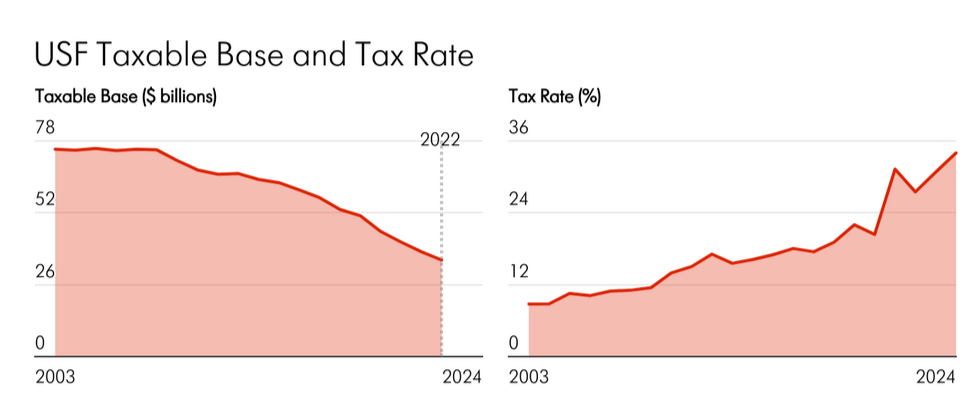Telecom Analysts Urge Congress to Fund the USF Annually
Current USF funding system is not only regressive but also wastes money, say Scott Wallsten and Greg Rosston.
Ted Hearn

WASHINGTON, Aug 31, 2024 – Congress needs to take control of a major federal subsidy program that keeps rural areas, anchor institutions, and low-income Americans connected to the Internet, according to two telecom policy experts.
In a new analysis, economists Scott Wallsten and Gregory Rosston said they want the $8.1 billion Universal Service Fund to become an annual congressional spending measure and reformed programmatically in ways that can steeply reduce the size of the fund without causing a reduction in service.
"Funding the [USF] program from general government revenues, as Congress did with the Affordable Connectivity Program, is more efficient and less regressive than the current system," said Wallsten and Rosston in their analysis posted Aug. 28 on the Technology Policy Institute website.
Opponents cited by FCC Chairwoman Jessica Rosenworcel in a letter to Congress claimed that an annual appropriations process would be unpredictable and could harm USF recipients that need a stable source of funding to support their broadband networks.
The USF's High Cost Fund – which provides hundreds of rural Internet providers with $4.3 billion in network funding support – can come down in cost by half if the mix of technologies eligible for support were expanded, Wallsten and Rosston said
"Satellite and wireless providers are likely to be able to serve higher cost areas with much lower, if any, subsidy," they said. "The High Cost Fund has outlived its usefulness, particularly as new technologies render even the term 'high cost' nearly meaningless."
Walsten is TPI's president and Rosston is a Senior Fellow at the Stanford Institute for Economic Policy Research.
In 2023, the USF also spent $2.5 billion to connect schools and libraries, $870 million to assist low-income Internet users, and $468 million on telemedicine and tele-health services provided by rural health facilities.

A group of Capitol Hill lawmakers has been working to shore up the fragile USF, perhaps by requiring Big Tech and broadband ISPs to contribute revenue to expand the contribution base and perhaps add the ACP to the USF's menu of programs.
Sen. Ted Cruz, R-Texas, the senior Republican on the Commerce Committee, has been a prominent advocate for the approach favored by Wallsten and Rosston: Replace industry funds that support the current USF with annual appropriations by Congress.
"To get spending under control, Congress – not the FCC – must take charge of defining universal service and deciding where USF funds may go," Cruz said.
Wallsten and Rosston argued that the current USF funding mechanism was regressive because it put the entire financial burden on a shrinking pool of consumers still making long-distance and international phone calls. That, they added, would end by funding the USF from general revenues.
"The tax burden would be shared over a large base, meaning it would be relatively small and minimally distortionary," the two said, adding that an annual funding exercise would "create pressure to keep the size of the fund low and therefore for its programs to operate efficiently."









Member discussion